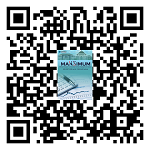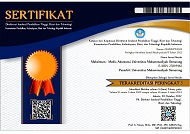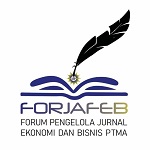PENGARUH KUALITAS AUDIT DAN KOMITE AUDIT TERHADAP PERILAKU PENGHINDARAN PAJAK (TAX AVOIDANCE)
(1) PASCASARJANA DOKTORAL UIN SUNAN KALIJAGA YOGYAKARTA
(2) UIN Sunan Kalijaga Yogyakarta
(*) Corresponding Author
Abstract
This study aims to analyze the effect of audit quality proxied by the size of the auditor and audit tenure, while the audit committee proxied by the number and composition of audit committee competency expertise on tax avoidance behavior calculated by the Cash ETR (CETR) method. The population used is companies registered in the Jakarta Islamic Index (JII) in 2015 to 2019, using purposive sampling technique, 11 companies with 55 observations were obtained. This study uses panel data regression, with the best approach after testing the fixed effect model. The results of this study reveal that audit tenure has a positive effect on tax avoidance behavior and the number of audit committees has a significant negative effect on tax avoidance behavior, while auditor size and accounting background have no significant effect on tax avoidance behavior.
Keywords
Full Text:
PDFReferences
Amstrong, Christopher. S., Jenniver L. Blouin, Alan D. Jagolinzer dan David F. Larcker. (2013).” Corporate Governance, Incentives and Tax avoidance”. Rock Center for Corporate Governance Working Paper Series no. 136.
Alzoubi, E. S. S. (2018). Audit quality, debt financing, and earnings management: Evidence from Jordan. Journal of International Accounting, Auditing and Taxation, 30, 69-84.
Bae, S. H. (2016). The Association Between Corporate Tax avoidance And Audit Efforts: Evidence From Korea. Journal of Applied Business Research (JABR), 33(1), 153-172. https://doi.org/10.19030/jabr.v33i1.9887
Brooks, L. Z., Cheng, C. S., & Sun, P. Y. (2012). Audit Tenure, Tax avoidance, and Firm Valuation. In CAAA Annual Conference.
Chai, H, dan Liu, Q. (2010).“Competition and Corporate Tax avoidance: Evidence from Chinese Industrial Firms”.
DeAngelo, L. E. (1981). Auditor size and audit quality. Journal of accounting and economics, 3(3), 183-199.
Donohoe, M. P., & Robert Knechel, W. (2014). Does corporate tax aggressiveness influence audit pricing?. Contemporary Accounting Research, 31(1), 284-308.
Dyreng, Scott D., Michelle Hanlon, Edward L. Maydew. (2010). “The Effect of Executives on Corporate Tax avoidance”. The Accounting Review, Vol. 85, Juni 2010, pp 1163-1189.
Hanlon, Michelle and Shane Heitzman. (2010). “ A Review of Tax Research”. Journal of Accounting and Economics, Vol 50, pp 127-178.
Jensen, M. C., & Meckling, W. H. (1979). Theory of the firm: Managerial behavior, agency costs, and ownership structure. In Economics social institutions (pp. 163-231). Springer, Dordrecht.
Jeong, S. W., & Bae, S. H. (2013). The Association between Corporate Tax avoidance and Auditor Tenure Evidence from Korea.
Kanagaretnam, K., Lee, J., Lim, C. Y., & Lobo, G. J. (2016). Relation between auditor quality and tax aggressiveness: Implications of cross-country institutional differences. Auditing: A Journal of Practice & Theory, 35(4), 105-135.
Krishnan, G.V. dan G. Visvanathan. (2007). “Does The SOX Definition of An Accounting Expert Matter? The Association Between Audit Committee Directors’ Accounting Expertise and Accounting Conservatism.”
Martinez, A. L., & Lessa, R. C. (2014). The effect of tax aggressiveness and corporate governance on audit fees evidences from Brazil. Journal of Management Research, 6(1), 95.
Minnick, K. dan T. Noga. (20100. “Do corporate governance characteristics influence tax management?” Journal of Corporate Finance 16 (2010), h. 703-718.
Mulyani, S., Kusmuriyanto, K., & Suryarini, T. (2018). Analisis determinan tax avoidance pada perusahaan manufaktur di Indonesia. Jurnal RAK (Riset Akuntansi Keuangan), 2(2), 53-66.
Lestari, Nanik & Nedya, Sucitra. (2019). The Effect of Audit Quality on Tax Avoidance. 10.2991/icastss-19.2019.69.
Puspita, S. R., & HARTO, P. (2014). Pengaruh Tata Kelola Perusahaan terhadap Penghindaran (Studi terhadap Perusahaan Non-Keuangan yang Terdaftar di Bursa Efek Indonesia Tahun 2010-2012) (Doctoral dissertation, Fakultas Ekonomika dan Bisnis).
Rego, S. O. (2003). Tax‐avoidance activities of US multinational corporations. Contemporary Accounting Research, 20(4), 805-833.
Robinson, J.R., Y. Xue, dan M.H. Zhang. (2012). “Tax planning and financial expertise in the audit committee.
Salehi, M., Tarighi, H., & Shahri, T. A. (2020). The effect of auditor characteristics on Tax avoidance of Iranian companies. Journal of Asian Business and Economic Studies
Smaili, N., & Labelle, R. (2009). Preventing and Detecting Accounting Irregulari-ties: The Role of Corporate Govern-ance. Diakses dari https://ssrn.com/abstract=1324143.
Spence, M. (1978). Job market signaling. In Uncertainty in economics (pp. 281-306). Academic Press.
Tandean, V. A., & Winnie, W. (2012). The Effect of Good Corporate Governance on Tax avoidance: An Empirical Study on Manufacturing Companies Listed in IDX period 2010-2013. Asian Journal of Accounting Research.
Van Tendeloo, B. (2007). Audit quality and tax-induced earnings management in UK private firms.
Zhang, Y., Zhou, J., & Zhou, N. (2007). Audit committee quality, auditor independence, and internal control weaknesses. Journal of accounting and public policy, 26(3), 300-327.
Article Metrics
Abstract view : 997 timesPDF - 14 times
DOI: https://doi.org/10.26714/mki.11.1.2021.58-66
Refbacks
-----------------------------------------------------------------------------------------------------------------------------------------------------------------------------------
 | MAKSIMUM: Media Akuntansi Universitas Muhammadiyah Semarang |
![]()
Maksimum: Media Akuntansi Universitas Muhammadiyah Semarang is licensed under a Creative Commons Attribution Attribution-NonCommercial-NoDerivatives 4.0 International License.

















